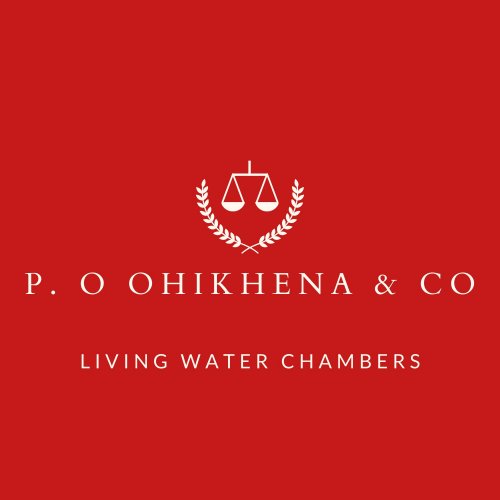Best Public-Private Partnerships (PPP) Lawyers in Benin City
Share your needs with us, get contacted by law firms.
Free. Takes 2 min.
List of the best lawyers in Benin City, Nigeria
About Public-Private Partnerships (PPP) Law in Benin City, Nigeria
Public-Private Partnerships (PPP) are collaborative arrangements between government entities and private sector companies for the provision of infrastructure and public services. In Benin City, Nigeria, PPPs are increasingly seen as an essential strategy for improving infrastructure such as roads, hospitals, schools, and utilities. Under a PPP, the government works with private investors to finance, design, implement, operate, and maintain public projects. These arrangements help bridge budget gaps and leverage private sector expertise while ensuring that public needs are effectively met.
Why You May Need a Lawyer
Legal advice is important when dealing with Public-Private Partnerships because the agreements are typically complex and involve significant regulatory, financial, and operational considerations. You may need a lawyer if you are:
- A private investor seeking to participate in or bid for a PPP project in Benin City.
- Representing a company that has been awarded a PPP contract and needs help with negotiations, compliance, or implementation.
- A government official or agency seeking guidance on structuring PPP frameworks and drafting contracts.
- Dealing with disputes related to PPP performance, funding, or contractual obligations.
- Seeking to understand your rights and responsibilities under the existing PPP regulations in Nigeria and Edo State.
A lawyer ensures that all agreements follow applicable laws, protect your interests, and help manage potential risks.
Local Laws Overview
PPP projects in Benin City are governed by both national and Edo State-specific legislation. The Infrastructure Concession Regulatory Commission (ICRC) Act is the principal federal law on PPPs in Nigeria and sets the standards for procurement, implementation, and management of PPP arrangements. At the state level, Edo State has established its own PPP office and follows guidelines in alignment with federal frameworks but tailored to local priorities.
Key aspects include:
- Formal tendering and transparent procurement processes.
- Requirement for Value for Money analysis before any agreement is signed.
- Clear allocation of risks and responsibilities between public and private partners.
- Provision for dispute resolution mechanisms such as mediation or arbitration.
- Obligation to comply with environmental, social, and labor regulations.
- Mandatory approval from the ICRC and relevant state regulatory bodies.
Frequently Asked Questions
What is a Public-Private Partnership (PPP)?
A Public-Private Partnership is an arrangement where the government and private sector cooperate to deliver projects or services that are traditionally provided by the public sector. These partnerships share risks, resources, and rewards between both parties.
What types of projects qualify as PPPs in Benin City?
Typical PPP projects include construction and management of roads, bridges, housing, hospitals, power plants, water facilities, and educational institutions.
Who regulates PPPs in Benin City?
PPPs are regulated by the Infrastructure Concession Regulatory Commission (ICRC) at the federal level and by the Edo State PPP office at the state level.
How can a company participate in a PPP project?
A company must respond to requests for proposals (RFPs) issued by the government, submit bids, and meet technical and financial requirements specified in the tender documentation.
What are the main risks involved in PPPs?
Risks include financial risks, regulatory changes, construction delays, performance shortfalls, political risks, and changes in demand for the service.
How long do PPP contracts typically last?
PPP contracts can range from 5 years to 30 years or more, depending on the scale and complexity of the project.
Are foreign companies allowed to engage in PPPs in Benin City?
Yes, foreign companies may participate provided they comply with local investment, labor, and tax laws, and often must operate in partnership with local entities.
What happens if there is a dispute between the public and private partner?
Most PPP contracts include provisions for dispute resolution mechanisms, usually involving negotiation, mediation, and arbitration before resorting to courts.
Is there any government support or guarantee available for PPP projects?
Sometimes, government bodies may offer partial risk guarantees, viability gap funding, or support to make projects more attractive to investors, depending on specifics of the project.
Do PPP projects require community engagement or environmental approvals?
Yes, projects usually require environmental assessments and community consultations to ensure compliance with national and state regulations.
Additional Resources
Here are some resources and organizations in Benin City and Nigeria that can provide further guidance and support:
- Infrastructure Concession Regulatory Commission (ICRC)
- Edo State Public-Private Partnership Office
- Nigerian Investment Promotion Commission (NIPC)
- Federal Ministry of Finance
- Nigerian Bar Association - Edo State Branch
- Local chambers of commerce
- Project management and infrastructure advisory consultants with expertise in Nigerian PPPs
Next Steps
If you are considering involvement in a PPP project in Benin City, Nigeria, or are already engaged and require legal support, the following steps can help:
- Identify your specific role or interest in the PPP process.
- Gather relevant documents such as proposals, contracts, RFQs, or feasibility studies.
- Consult a lawyer experienced in PPP matters within Nigeria, preferably with local knowledge of Edo State practices.
- Schedule an initial meeting to discuss your objectives and potential risks involved.
- Ask your lawyer to review legal documents, handle negotiations, and advise on regulatory compliance.
- Keep lines of communication open with all stakeholders, government agencies, and regulatory bodies throughout the process.
Legal support is crucial for success in PPPs. Taking proactive legal steps ensures proper project structuring, risk management, and maximizes the chances of a successful outcome.
Lawzana helps you find the best lawyers and law firms in Benin City through a curated and pre-screened list of qualified legal professionals. Our platform offers rankings and detailed profiles of attorneys and law firms, allowing you to compare based on practice areas, including Public-Private Partnerships (PPP), experience, and client feedback.
Each profile includes a description of the firm's areas of practice, client reviews, team members and partners, year of establishment, spoken languages, office locations, contact information, social media presence, and any published articles or resources. Most firms on our platform speak English and are experienced in both local and international legal matters.
Get a quote from top-rated law firms in Benin City, Nigeria — quickly, securely, and without unnecessary hassle.
Disclaimer:
The information provided on this page is for general informational purposes only and does not constitute legal advice. While we strive to ensure the accuracy and relevance of the content, legal information may change over time, and interpretations of the law can vary. You should always consult with a qualified legal professional for advice specific to your situation.
We disclaim all liability for actions taken or not taken based on the content of this page. If you believe any information is incorrect or outdated, please contact us, and we will review and update it where appropriate.











